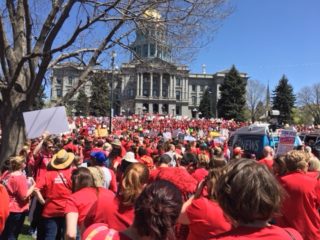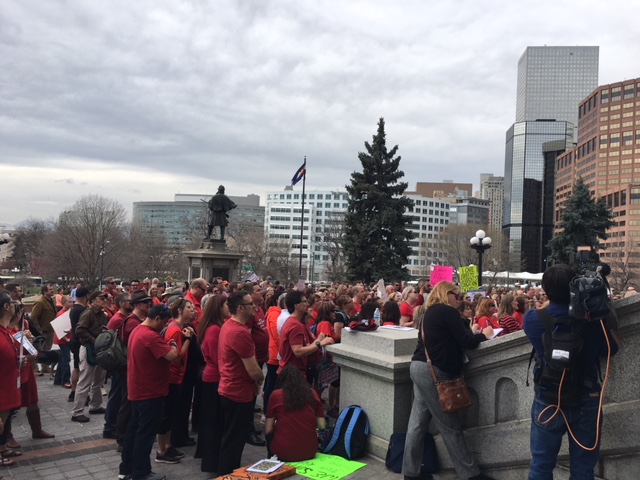SB 191 Under Attack?

It ought to go without saying that an effective public education system should seek to identify classroom instructors who are successful and those who are not in order to reward and incentivize the former and to correct the latter. This was ostensibly the aim of the 2010 Senate Bill 191, the provisions of which continue to find themselves under near-constant attack nearly a decade after Gov. Ritter signed it into law.
Read More...
DPS Open Negotiations -See for Yourself

Since last spring, the public has witnessed a growing number of teachers who have expressed their frustration with the level of education funding from both the state legislature and their own districts’ compensation plans. In April last year, thousands of teachers rallied on multiple days at the State Capitol Building as the legislature discussed the School Finance Act. In May, Pueblo School District 60 teachers held a five day strike successfully demanding an increase in pay. Denver teachers have been ready to strike for months.
Read More...
New Teacher Evaluation Systems are Improving Student Outcomes

An October 2018 report examines how initially controversial teacher evaluation systems have led to improved student outcomes. The report, Making a Difference: Six Places where Teacher Evaluation Systems are Getting Results was published by the National Council on Teacher Quality. The study analyzes several transformational teacher evaluation systems and how each impacted student achievement. A decade’s worth of reform has helped Tennessee climb from near the bottom, to the middle of the pack on the benchmark national education scores, the National Assessment of Educational Progress (NAEP). In Dallas, a teacher evaluation system has helped increase student proficiency seven percentage points in all grades and subjects. In Denver, students have consistently outpaced the average Colorado state student in English and math since the inception of their teacher rating system. Innovative teacher evaluation systems in the District of Columbia, Newark, and New Mexico have also benefited both students and teachers. These effective teacher evaluation systems are tied to incentives and supports and are designed to distinguish between teachers at different performance levels; reward effective teachers and keep them teaching; identify consistently less-effective teachers in order provide supports or end their contracts; create tailored teacher improvement strategies; recruit new effective teachers; and most […]
Read More...
Let’s Celebrate National Employee Freedom Week!

This week is National Employee Freedom Week and there is certainly reason to celebrate! On June 27, 2018 the U.S. Supreme Court released hundreds of thousands of non-union public employees from the burden of paying agency fees via the Janus v. AFSCME decision.
Read More...
Janus v. AFSCME: Free Speech Wins, Unions Lose

The Supreme Court of the United States today dealt a major blow to public sector employment unions. At issue was whether public sector unions are permitted to withhold fees, without consent, from employees who do not want to join the union. The specific law at issue in the case is an Illinois law that allowed public sector unions to withhold what is called an “agency fee” from nonmember employees. The idea is that where a union has been recognized as the exclusive bargaining unit, it has the responsibility to represent all employees during collective bargaining, whether member or not. Thus, the agency fee, which amounts to a specified percentage of the normal union dues, is justified—or so the argument goes—because the nonmember employee is receiving benefits of representation. The Supreme Court disagreed.
Read More...
New Update: Teacher Walkouts Potentially Cost Taxpayers $ 13.3 Million

According to Colorado Chalkbeat, 27 Colorado school districts have cancelled classes due to the teacher walkouts scheduled later this week. Based on the average teacher salary in each district plus the cost of PERA benefits, the teacher walkouts in the 27 districts are potentially costing taxpayers $13.3 million. This figure does not include classified employees who serve at each school.
Read More...
Bipartisan Vote Sinks Anti-Accountability Bill… Again
I’m back after a brief hiatus, and we’ve got some catching up to do on the legislative front. Specifically, we can celebrate the fact that Sen. Michael Merrifield has learned once again that doing the same thing over and over again may not be the best approach. I wrote a rather snarky post a few weeks ago about Merrifield’s SB 067, which was functionally identical to last year’s SB 105. Both bills sought to gut tenure reform, performance pay, and merit-based personnel decisions by essentially blowing up strong educator evaluations. In particular, Merrifield was once again attempting to eliminate the requirement that evaluations include multiple measures of student growth. And once again, he failed to do so.
Read More...
If at First You Don't Succeed, Disregard All Feedback and Do Exactly the Same Thing Again
Everybody’s heard this famous advice: If at first you don’t succeed, try, try again. I have certainly heard my dad say something like that many times before. State Senator Mike Merrifield (remember him?) and his legislative allies must have also heard the saying somewhere, because they recently introduced Senate Bill 17-067—a practically identical copy of last year’s spectacularly defeated Senate Bill 16-105. The complete unwillingness to listen to any of the feedback—or learn any of the political lessons—that came out of the SB 105 debacle last year is striking. That old saying about trying again is definitely a good reminder of the importance of persistence, but I’m not sure it should be interpreted as refusing ever to rethink one’s position on bad public policy. After all, the saying is not “If at first you don’t succeed, disregard all feedback and do exactly the same thing again.” I could write a big blog post about why SB 067 is bad policy that holds the potential to harm students; destroy important collective bargaining reform, teacher tenure reform, performance-based compensation systems, and a variety of other things (which is its intended purpose); and decrease fairness for teachers by refusing to acknowledge and reward […]
Read More...
Big Win for Florida Students Kicks Off National School Choice Week 2017
It’s National School Choice Week again, my friends. This year’s celebration of educational opportunity is the biggest yet with more than 21,000 events attended by more than six million people across all 50 states. You can help us celebrate the occasion by stopping by the Colorado Capitol on Thursday, January 26, at 11:30 AM. If you live further south, there will also be a rally at the Colorado Springs City Hall at 9 AM on January 24. If neither of those options works for you, you can take a look at this interactive map to find another event in your area. No matter where you live, you should plan to get to a NCSW rally. There will be lots and lots of fuzzy yellow scarves as usual, and you’ll get to go home feeling pretty fuzzy yourself for having helped promote opportunity for all students. There’s plenty to celebrate during National School Choice Week 2017, like the fact that educational choice just keeps on expanding all across the United States. There are more than 2.5 million students enrolled in more than 6,500 public charter schools in more than 40 states. Additionally, there are 61 private school choice programs of various types spread […]
Read More...
Unpacking AFT's Early LM-2 Christmas Present
‘Tis the season my friends. No, no, not for head-spinning shifts in store decorations (is anyone else freaked out by the jumbled Hallowthanksgivemas décor in some places?) or falling leaves or the first justifiable excuse to wear a frumpy sweater to work. ‘Tis the season for U.S. Department of Labor LM-2 filings for national unions. I know what you’re thinking. Why, Eddie, would I want to dig through an enormous federal form outlining the inner workings of a union? Well, because you never know what you might find in there! About this time last year, the Independence Institute uncovered the fact that despite Jeffco recall proponent’s vehement denials of union involvement (since completely abandoned in favor of overt bragging), the National Education Association dumped $150,000 into recall front group Jeffco United. Where’d that revelation come from? You guessed it, NEA’s 2015 LM-2. You see, LM-2s are like early Christmas presents—you never know what you might find. I’m not the only one who relishes ripping off the wrapping paper every year. The folks over at Union Watch also spend a lot of time unpacking the forms when they’re filed. I can only imagine their glee when they dug into the American […]
Read More...







